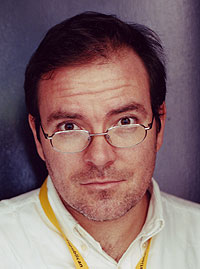You may (or may not) know that newspapers are once again threatening the Internet, claiming once again that links are theft (so don't expect me to link to any AP copy in the future).
Lauren Weinstein writes (correctly) that a well-written Robots.Txt can stop any links you don't like and that in any case Google (which seems to be the target) already has a valid business agreement with AP to host stories.
But that's not the problem. European newspapers are, in fact, doing quite well. American publishers have plundered their assets, first demanding enormous profit margins (by cutting jobs), then overloading the assets with debt, and now blaming the workers for all their faults.
Which brings me to the clip above. You'll note how six-figure salaried Ali Velshi, in his $1,000 vests, is calling an 84-year old waitress "lucky" because she has such low expectations.
That's the problem. The journalism industry, like the rest of America, has spent the last decades hollowing-out its middle class. There are a few at the top (and all on-air talent like Velshi counts), there are some people struggling at the bottom (like yours truly), and there is no longer anything in the middle.
(To the left, journalism entrepreneur Joshua Micah Marshall of TalkingPointsMemo, a profit-making online newspaper covering Washington from New York.)
The so-called "destruction of newspapers" is, in the end, going to be a good thing. Stories will demand coverage, reporters will create coverage, and new entrepreneurs will seize the opportunity to make money from coverage.
These new companies won't make much money, at first. They won't pay people much. But new companies never do. In time, though, they will find niches, they will find ways to profit, and they will turn the freelancers now blogging or vlogging for them into staff. It's a process that will accelerate once the current deadwood is cleared out. So the more newspapers that close in the short run, the better.
As to what these new local papers will be like. They won't have any use for the AP. They will be organizing their communities, lifestyles or industries as much as advocating them, as much as covering them. They will be by and about enthusiasts. And they will be narrowly focused — no need for national or international stories in the local viewpaper.
I have said it before and I'll say it again. I do wish I were 30 years younger, so I could go into this business with a clear conscience. As it is I'm fated to be some young publisher's Jack Cafferty. So be it.
But I saw the future, years ago, and that's my reward.











